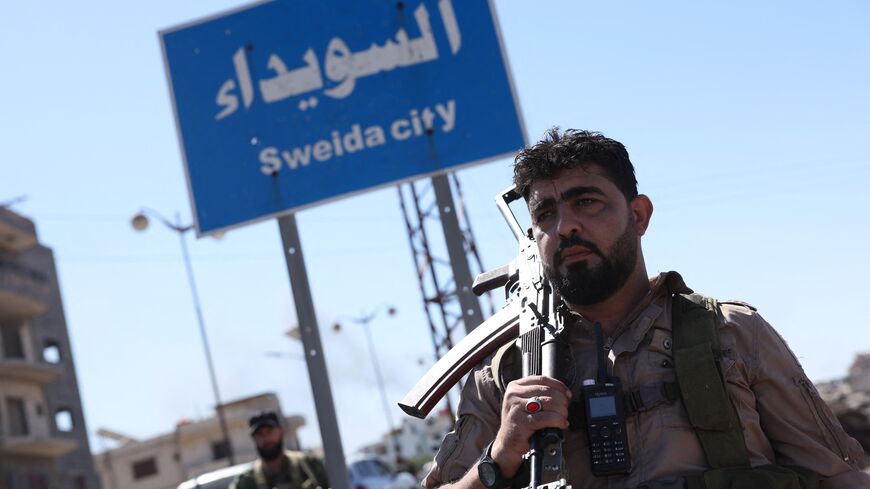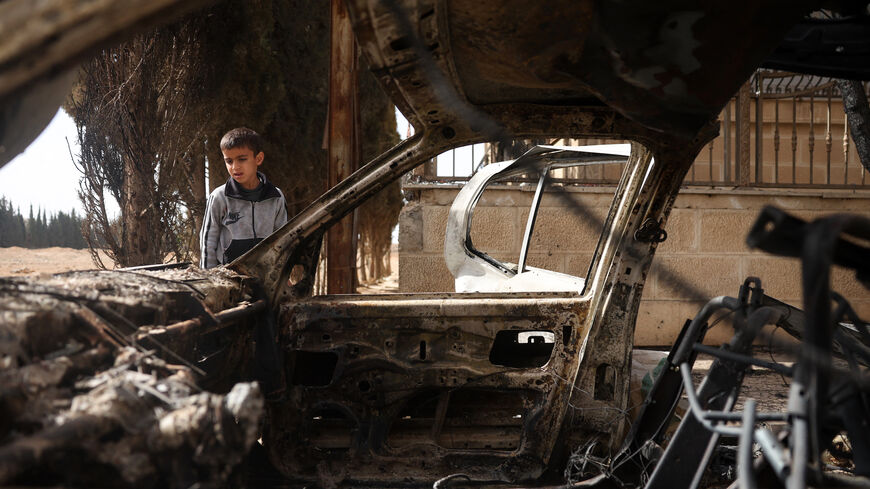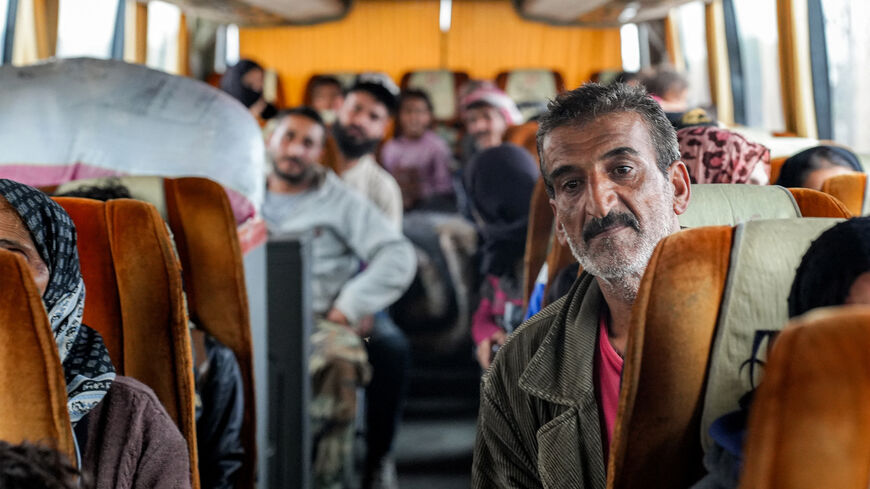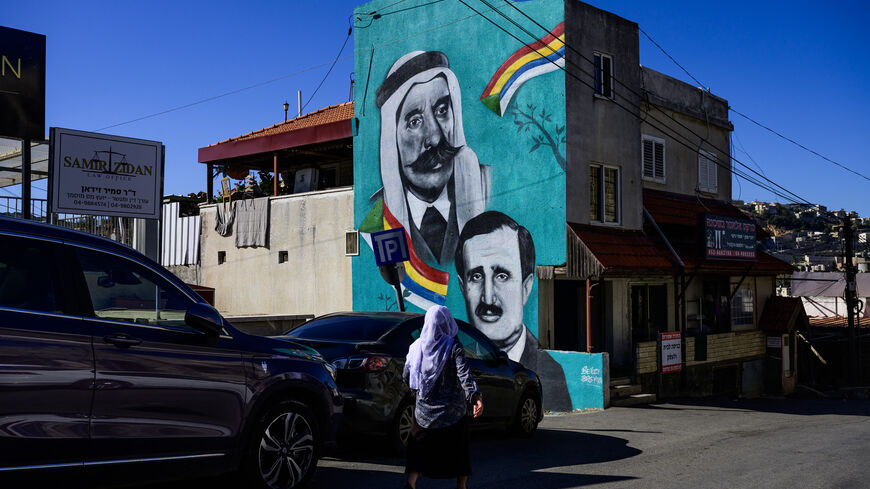Syria: Nearly 100 killed in fighting between Druze, Sunni tribes
Intervention by Syrian security forces to contain the escalation in Druze-majority Suwayda province has been met with resistance from the local Druze community.
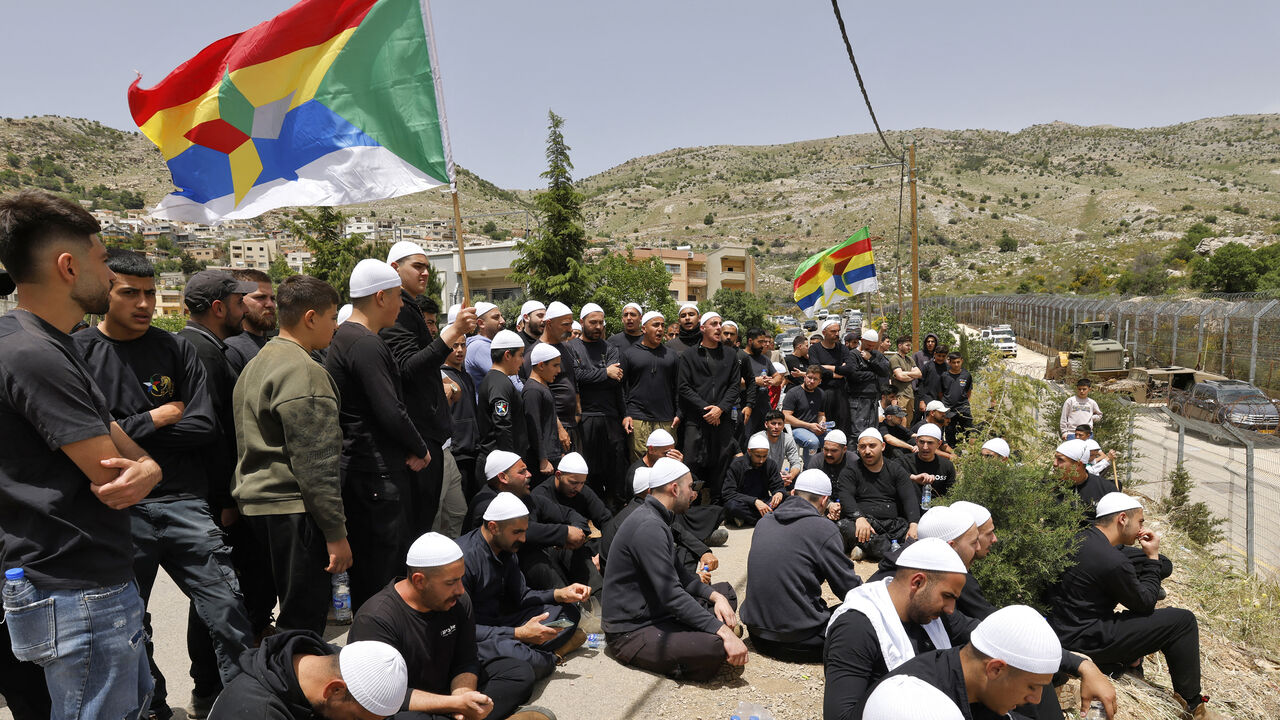
Heavy clashes between local Druze fighters and Bedouin clans that erupted over the weekend in Syria’s southern Suwayda province continued into Monday, leaving almost 100 people dead and raising fears of escalating violence in the Druze-majority region.
What happened: The violence erupted after a Druze merchant was robbed and kidnapped at a Bedouin checkpoint on the highway linking Damascus to Suwayda on Friday, triggering a series of kidnappings between the two groups.
The tensions escalated into armed clashes between groups from the Druze minority and Sunni Bedouin clans in the al-Maqous neighborhood of Suwayda city on Sunday, according to the Syrian Interior Ministry, before spreading to other parts of the province.
Local media reported that armed Bedouin tribesmen launched attacks on Druze villages on the western and northern outskirts of the city as well.
For its part, the Ministry of Defense said the army had deployed in Suwayda alongside security forces to “quickly and decisively disperse clashes,” and called on all parties in the area to cooperate with authorities and exercise self-restraint.
The Syrian Observatory for Human Rights said Monday evening local time that the death toll had reached at least 99 people. The UK-based war monitor said 60 of those killed were from Suwayda, along with 18 members of Bedouin tribes, 14 Syrian army soldiers and seven unidentified individuals.
Syria’s Interior Ministry and Defense Ministry said in separate statements Monday that they had coordinated the deployment of security and army forces to the area in an effort to stop the clashes.
In its statement, the Interior Ministry expressed deep concern over the escalation and acknowledged that an institutional vacuum in Suwayda had contributed to the current situation.
“This dangerous escalation came amid the absence of relevant official institutions, which exacerbated the state of chaos and deteriorating security, and left the local community unable to contain the crisis despite repeated calls for calm. This resulted in a rising death toll and poses a direct threat to civil peace,” the statement read.
قوى الأمن الداخلي ووحدات الجيش العربي السوري تنتشر في قرى السويداء استجابةً للتطورات الأمنية الأخيرة، وفض الاشتباكات، وحرصاً على منع تفاقم التوتر وضمان حماية المواطنين والممتلكات.#سوريا#السويداء#سانا pic.twitter.com/8qtQLHK3UQ
— الوكالة العربية السورية للأنباء - سانا (@Sana__gov) July 14, 2025
For its part, the Ministry of Defense said the army had deployed in Suwayda alongside security forces to “quickly and decisively disperse clashes,” and called on all parties in the area to cooperate with authorities and exercise self-restraint.
Local mistrust: The casualties reported among security and army personnel reflect deep mistrust within the local Druze community toward official authorities.
Syria’s highest religious authority for the Druze community, the Spiritual Leadership of the Unitarian Druze Muslims, rejected the intervention of Syrian security forces in Suwayda on Monday, stating that they entered the province’s administrative border under the pretext of providing protection.
“But they proceeded to bombard our people in the border villages and were supporting the takfiri gangs with their heavy weapons and drones,” the leadership said in a statement, using the Islamic term “takfiri,” which refers to apostates and is often used to describe radical groups such as the Islamic State.
“We hold fully responsible everyone who participates in the attack on our areas and our people, and everyone who seeks to allow the General Security to enter our areas,” the statement continued, reaffirming the community’s call for international protection.
Similarly, the Men of Dignity, a Druze faction operating primarily in Suwayda, condemned the clashes, warning that they threaten civil peace and pave the way for chaos.
While calling for de-escalation, the faction held the Syrian government “primarily responsible for the current situation due to its failure to maintain security, its silence in the face of repeated violations and its tolerance of affiliated factions interfering and siding with one group over another.”
Videos circulating online — whose authenticity could not be independently verified — appeared to show armed men said to be affiliated with Druze spiritual leader Sheikh Hikmat al-Hijri arresting and assaulting security and army personnel in Suwayda.
Background: The Druze — one of several minority groups in Syria who follow an offshoot of Shiite Islam — are mainly concentrated in the south, including the Suwayda province. There are approximately 700,000 Druze in Syria. Although marginalized under the Assad regime, the Druze remained relatively neutral throughout the Syrian civil war, managing their own local affairs.
Following the fall of President Bashar al-Assad last December, the Druze community sought assurances of inclusion and fair representation from the new Syrian leadership under President Ahmed al-Sharaa.
In May, the Syrian government reached a security agreement with Druze leaders in Suwayda to activate the roles of the Ministry of Interior and judicial police, whose forces would be made up of local residents. According to the agreement, the government would secure the Damascus-Suwayda highway without deploying external security personnel inside the province.
The agreement followed weeks of rising tensions in the area.
Know more: In April, sectarian clashes erupted between Sunni fighters and Druze residents in the town of Jaramana, located in the Damascus countryside, leaving dozens dead. The violence was reportedly triggered by an audio recording of a Druze man insulting the Prophet Muhammad.
The clashes, which continued into early May, spread to other nearby Druze-majority towns, including Sahnaya, Ashrafiyat Sahnaya, as well as Suwayda.
Meanwhile, Israel, which has sought to cultivate ties with Syria’s Druze community since the fall of the Assad regime, has repeatedly warned Syrian authorities against harming the Druze population.
On May 2, the Israeli military launched more than 20 airstrikes across Syria following an attack near the presidential palace in Damascus. At the time, Israeli Prime Minister Benjamin Netanyahu described the strike as a “clear message to the Syrian regime,” asserting that Israel would “not allow the deployment of forces south of Damascus or any threat to the Druze community.”
The Israeli military announced it struck tanks on Monday that were moving towards Suwayda, saying the vehicles “posed a threat to the state of Israel" without offering further information.
Since his appointment as Syria’s president in January, Sharaa has been working to consolidate his authority and present himself as a unifying leader for the country. However, his efforts face significant challenges.
In March, clashes between pro-Assad militias and security forces in Latakia and Tartous resulted in over 1,000 deaths, including 745 civilians. The violence triggered revenge attacks against the Alawite community, which has been a key support base for Assad throughout the Syrian civil conflict.
Adam Lucente contributed to this report.

